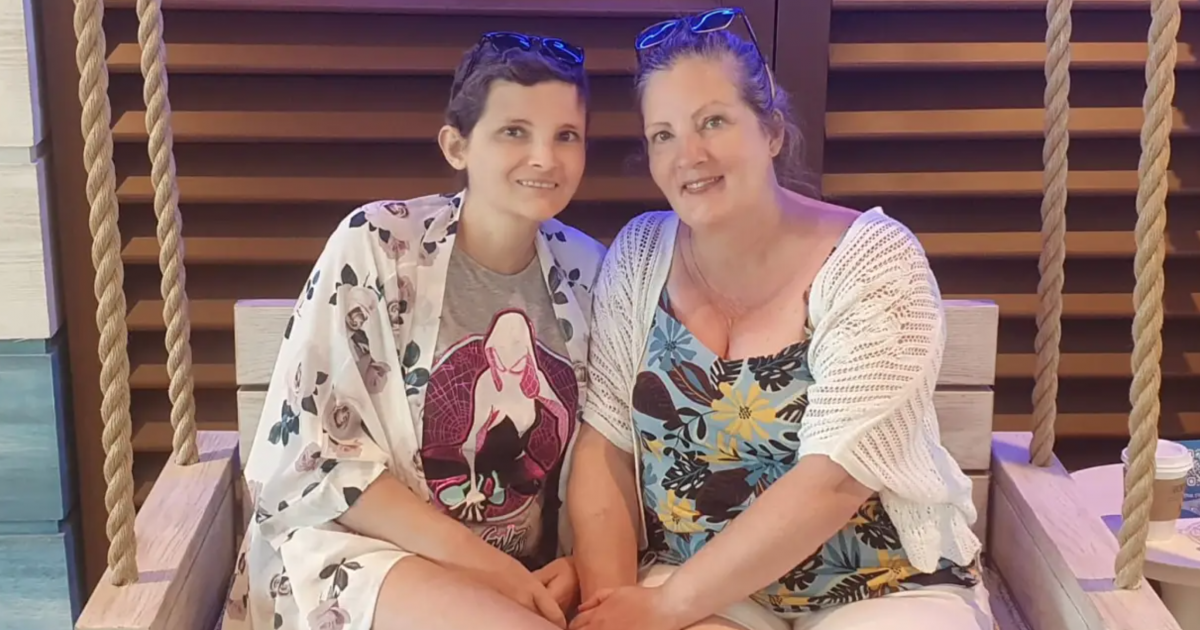A Relentless Fighter
- Now 25, Rebekah Hawkins was 17 when she was first diagnosed with medulloblastoma, a form of brain cancer.
- Hawkins has undergone years of intense treatment, including multiple surgeries and extensive chemotherapy and radiation.
- Radiation and surgery are no longer options for her, but her family hopes she will be able to receive more chemotherapy as palliative care. Hawkins’s mother is raising money to build her a bedroom that can accommodate her medical needs.
Rebekah Hawkins has battled brain cancer since she was just 17, fighting through draining cancer treatments and intense surgeries. On the heels of another relapse, Rebekah's mother is trying to raise money to set her up in a room where she can receive adequate care so she will not have to move to a facility.
Read More"I broke down in front of Rebekah," she said. "One of the doctors told me I needed to pull myself togetherthat I needed to be there for my daughter. And that’s what we did. We pulled ourselves together and got on with whatever we needed to do. So now we're still staying strong. Trying to get through it."
Where Is Rebekah Now?
Eight years have passed, and Rebekah has been stuck in a cycle of brain cancer relapses. She has undergone extensive grueling treatment, including numerous surgeries, and many rounds of radiation and chemotherapy.
In one devastating (but successful) brain surgery, Rebekah lost her ability to speak and to move the left side of her body. "That was quite dramatic because she was a different person coming back," her mother said. After a string of relapses, Rebekah is no longer able to receive surgery or radiation. The family is waiting to determine whether she can receive chemotherapy as palliative care.
"Rebekah had relapsed and everything she’s fought off the last eight years has come back," Rebekah's mother said. "It’s been four weeks now and we’re waiting on a phone call to see if they have somebody to actually start the treatment."
Rebekah's family is focused on fundraising to upgrade her bedroom to accommodate her as she approaches the end of treatment. They hope to build a bathroom connected to her room and a lift to take Rebekah between rooms without her having to use the stairs.
"We want to give her somewhere special, where she can be comfortable," explains Deborah.
By building a bedroom that suits Rebekah's needs, her mother hopes to keep the family together as long as possible. "We hope to be here for a while," she said.
Palliative Care
The National Cancer Institute (NCI) defines palliative care as "an approach to care that addresses the person as a whole, not just their disease." It's a type of care that's meant to address the symptoms and side effects that your cancer or its treatment may cause, ranging from psychological experiences like stress and fear to physical experiences like pain and discomfort.
However, it is important to know that palliative care isn’t just for patients at the end of life. It is a term that refers to numerous supportive services. Research has shown that seeing a palliative care team from the very beginning of your cancer journey can improve both quality of life and overall survival time.
With Palliative Cancer Care, The Sooner the Better
Dr. Elizabeth Kvale, the director of the Supportive Care and Survivorship Program and medical director of the cancer treatment program at LIVESTRONG Cancer Institutes at UT Health Austin, expanded on this topic in a previous interview with SurvivorNet.
"People who get palliative care actually live longer than people who don't get palliative care when they have advanced cancer,” Dr. Kvale said. "The survival advantage that people get with cancer is about three months if they get early palliative care."
How often a patient meets with their palliative care team will vary depending on their unique needs. Some patients might meet with a palliative care specialist every week to manage side effects. Others might meet every month or every couple of months, continuing even after treatment has ended.
Palliative care teams can help to address not only their physical side effects, but also the emotional and financial impacts of a cancer diagnosis. "The sooner patients with serious cancer get palliative care, the better," Dr. Kvale said.
Living BetterWhat is Palliative Care?
Contributing: Marisa Sullivan
Learn more about SurvivorNet's rigorous medical review process.


